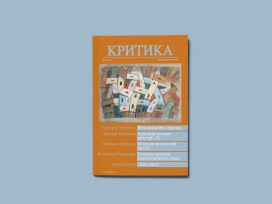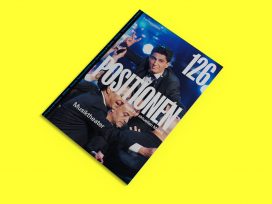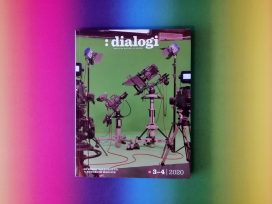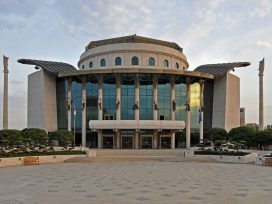There is no big money in writing about theatre, this is an established fact. Moreover, strivings on the battlefield for theatre are substantial and there is a high turnover in the generations of warriors. The tradition of writers on theatre is strong (Irena Staudohar, Lado Kralj, Aljosa Kolenc, Simon Kardum, Emil Hrvatin, Eda Cufer, Ursula Cetinski, Maja Breznik), but many of them have shifted their interest to other fields of activity. The number of theatre theory authors is actually scarce (Rok Vevar, Tomaz Toporisic, Mojca Puncer, Barbara Orel, Aldo Milohnic, Blaz Lukan, Bojana Kunst, Marina Grzinic). However, the critique of performing arts by younger generations (Ana Perne, Matic Kocijancic, Zala Dobovsek, Katja Cicigoj, Pia Brezavscek) has established itself as a progressive sector of the cultural scene (while such critique in the fine arts is in fact absent) – the level is high and is being shaped by continuous writing and by the quality of the editorial programme in the field of theatre. Nevertheless, the crisis of recent times can be felt in the basis of theatre theory as well. Actually in the perception and reception, which have a strong impact on the evolution of the field. How shall we proceed? Will we hold on to the autonomous culture of writing on theatrological issues? Or will a fragmented state of things prevail? A recent example only evokes a bad feeling.
At a recent presentation of a new volume of Slovene theatrological thought entitled Svobodne roke (transl. “Free hands”; published by AGRFT and Maska) in the National Theatre Museum of Slovenia, nothing very crucial happened. We experienced an event of the kind to which we have grown all too accustomed. At similar events that accompany the publication of new books we are glad to meet one other again, at the same time feeling that our number is rather small and we ask ourselves about the reasons for this – then the event quickly turns into a search for a needle in the haystack. The two invited speakers tell us that they first checked whether they were acquainted with the author names in the book. However, they were “shocked” not to find the usual suspects. And so we first tackled the question as to who is NOT present in the book, rather than the book’s substance; we are thus more interested in the method of selection. Trying to explain the original intent of the editors did not change much.
At the same time, let us only mention the fact that the connoisseurs of Slovene theatre history have up to now not gathered their knowledge in a book format (be it defined as an anthology or not), from which the next generations would benefit as well. Are we truly aware of what we have? Are we capable of providing it? Perhaps the ambition would need to coincide with so many different views and the a priori acknowledgements of so many authors with big shadows that the sovereignty of the selection process would become, to a great extent, compromised. This wouldn’t involve looking for truly surprising texts anymore, texts that would test the perception of writing about theatre. Such an endeavour would make do with political correctness and courteousness. It would in fact nullify the passionate relation to its subject, or at least put it on the line. What a pity: even when the selection process involves the works of living thinkers and, therefore, a large pool of authors, the final selection remains all too narrow.
How much freedom and independence is allowed in the historicization of writing about theatre? The recently replaced supervising board member of the Nova ljubljanska banka from the Netherlands was clear: it is impossible to be independent in Slovenia. What she didn’t utter can be added here: one always belongs to someone, always devotes oneself to someone. A frightful situation but one that rings true with reference to everyday life in Slovenia. Among the experts who would like to contribute to defining the canon, a battle for interpretation starts immediately and consensus as to conceptualization among the circles of the recognized is hardly possible. Every editor will prefer specific writings, and this freedom must be allowed. On the other hand, the intention behind the current selection of texts was not to select authors before whom we should take our hats off, but rather to discover texts that evoke the enthusiasm of the contemporary reader and to showcase once again, in a new context, authors who have already been compromised by pragmatism. The structure of the book opens up a new space devoid of any kind of dictate. One can simply not avoid the reproach that the approach is overshadowed by ideology.
When a project of this kind appears, a competition commences in which the aim is to find questionable aspects in the end product. The same happens with the selection process, the other form of custody over arts. The fact that the selectors have in recent years gotten “younger” doesn’t help the selector. It can even happen that the jury, in a nonchalant way, reproaches the selector for a non-representative selection, even though it doesn’t seem to grasp (or is able to see?) the logic of the selection. Foreign jury members show no interest in informing themselves about the substance that they look at only with ‘pro’ or ‘contra’ in mind. The selector does best to prepare himself for a cold shower. Even those who agree remain silent. No opponent expresses their objections in writing since the soundness of their arguments is shaky. Or the jury distances itself from the selection before them by not addressing the main award. Or an author runs in who doesn’t accept his exclusion from the elite and puts the selector in a corner.
This is also why the mode of today’s theatre critiques avoids conflict and doesn’t provoke polemical replies. The impulse of wondering why today we see no vibrant polemics as in the past is superfluous. Critical words often remain unsaid, swallowed for a tactical reason – even though the artists expect criticism of substance where someone with a full name and with the use of arguments writes if and why someone is good or bad. Sometimes it simply isn’t enough to excel in analytics without putting things in their proper place.
The French general inspector for issues of culture, Benoît Paumier, has adopted the following, bold position: namely, that culture is not a luxury that must wait until the end, after we have taken care of everything else, and that culture is the “sector of the future”. But in Slovenia, this would convince only the already convinced. The current atmosphere is different from the one in the late 1950s, when (as Zoran Krzisnik, the founder of the Ljubljana International Graphic Biennial in 1955, explains) it was possible to convince politicians that culture is their future and an instrument for fostering a liberal openness that will not harbour social anxieties. Today, non-civilized and non-cultured states of mind can go along way, including the democratically elected parliament; also it is rather easy to publish a book in Slovenia or to enter into the media, and some are adept at exploiting this situation. At the same time, we approach the West in a different way: specialized arts criticism has been absent in the foreign press for a long time, and now it is almost entirely ousted in Slovenia as well. It is not in the interest of capital. “Who reads that at all?” we hear. And we don’t produce a sound, we don’t protest. After all, it is possible to persist with rather average creations as well. In a small state one gets to be known quickly and this produces an impression that one has achieved success. Nonetheless, taking a look at theatre performances does not fulfil the viewer if it seems that these performances consistently lack wit. The viewer tends to remain, for the most part, thoroughly underwhelmed.
To be an independent selector is an ideal and perhaps somewhat utopian too. Should an individual in this role in Slovenia consider the historical credits of individual authors and give in to established relations, such that firm measures become dispensable? Is this inevitable, perhaps self-evident in the current climate? Not necessarily. An independent selector will respond to the stage effect of the performance that moves the politics of staging onwards and will select in accordance with his aesthetic horizon, which has been shaped through viewing experiences at home and abroad.
For constructive judgment in the Slovene cultural field to exist and to last, a lot of space and will is needed (in the media and institutions, newspapers and magazines, where texts get published) and above all many different voices. The editorial filter of the media has in recent years (following rather diagonal decisions) rigorously cleansed the media space. Events still happen on a daily basis but many performances are left with no written records in the press. This silence is not wise, but a trace of ignorance. The excuses provided are numerous but the space (in heads too) continues to narrow.






